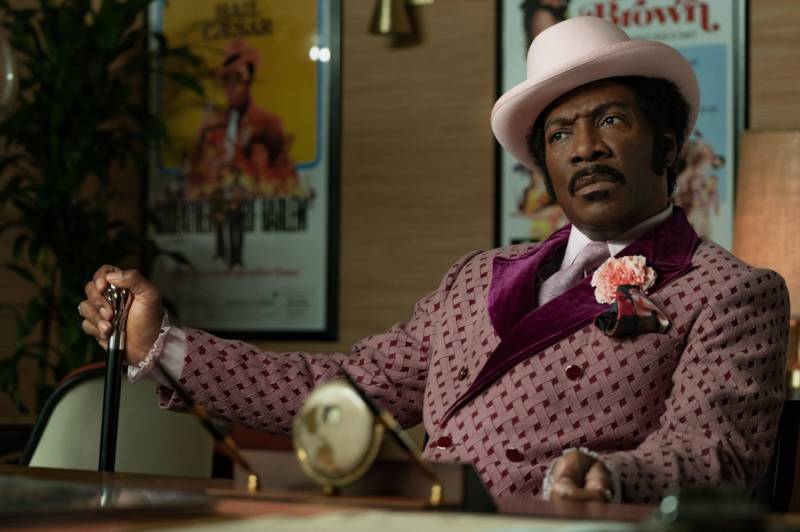Note: This film is now in limited theatrical release before debuting on Netflix on Friday, October 25th.
Eddie Murphy, who had name-above-title billing in a hit movie at 21, was one of the biggest stars in the world at 25, and whose imminent “comeback” has been a three-decade topic that a steady role in the animated Shrek franchise and an Oscar nomination (for Dreamgirls) couldn’t silence, is an odd choice to play Rudy Ray Moore.
Moore chased success as a singer, dancer, and stand-up before finding it in his mid-forties (in the early ’70s) in the persona of Dolemite, his pimp-styled character who delivered artfully filthy rhymes over a backbeat. In the decorous language of his 2008 New York Times obituary, Moore’s “standup comedy, records and movies related earthy rhyming tales of a vivid gaggle of characters as they lurched from sexual escapade to sexual escapade in a boisterous tradition, born in Africa, that helped shape today’s hip-hop.”
Certainly the blue-chip cast that has shown up to support Murphy in the buoyant-but-superficial Netflix biopic Dolemite Is My Name is its own tribute to Moore’s intersectional significance: Snoop Dogg and Chris Rock appear in two-scene roles, with Keegan-Michael Key, Titus Burgess, Craig Robinson, and Mike Epps in beefier parts as Moore’s various collaborators. Wesley Snipes’ effeminate characterization of D’urville Martin, who directed and played the villain in the 1975 blaxploitation classic Dolemite—the film that solidified Moore’s cult… stardom?—may strike some viewers as homophobic, but it’s the first real performance that Snipes, who a generation ago appeared to be an actor whose versatility and magnetisim were without limit, has given in too many years.
None of these men have been cast for their resemblance to the people they’re playing. But Murphy, despite how much he seems to love filling out Dolemite’s flamboyant suits, doesn’t even try to look or sound like Moore. (His Bill Cosby impression in his 1988 concert film Raw is a much closer act of mimicry than anything he does here.) He just throws himself headlong into this incurious depiction of Moore as an entertainer who didn’t much care whether his audience was laughing with him or at him, so long as they were laughing.

9(MDAxOTAwOTE4MDEyMTkxMDAzNjczZDljZA004))

